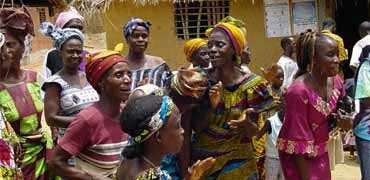GENDER BASED VIOLENCE

Domestic violence should not happen to anyone, in any place or at any time. But unfortunately, it does. Sadly, it is also endemic in West Africa. Violence against women has been identified as a major public health and human rights problem.
Violence affects the lives of millions of women in West Africa, in all socio-economic and educational classes. It cuts across cultural and religious barriers, impeding the right of women to participate fully in society.
Defining gender-based Violence
The UN-Declaration defines gender-based violence as "any act of violence that results in, or is likely to result in, physical, sexual or psychological harm or suffering to women, including threats of such acts, coercion or arbitrary deprivation of liberty, whether occurring in public or in private life".
This is the first international human rights instrument to exclusively and explicitly address the issue of violence against women.
Furthermore, the UN Declaration states that:
"Women are entitled to the equal enjoyment and protection of all human rights and fundamental freedoms in the political, economic, social, cultural, civil or any other field. These rights include:
- The right to life;
- The right to equality;
- The right to liberty and security of person;
- The right to equal protection under the law;
- The right to be free from all forms of discrimination;
- The right to the highest standard attainable of physical and mental health;
- The right to just and favorable conditions of work;
- The right not to be subjected to torture, or other cruel, inhuman or degrading treatment or punishment." (UN Declaration on the Elimination of Violence against Women).
Violence has many faces
FECCIWA is aware that violence against women takes a dismaying variety of forms:
- Battering a wife, an estranged spouse, an ex- wife, a child, or a domestic worker
- Domestic abuse
- Early marriages
- Female circumcision
- Incest
- Rape and rape in child marriages
- Traditional practices that violate women’s human rights.
All these different forms are violations of the most fundamental human rights.
Gender-based violence advocacy campaign
FECCIWA is aware of the violations of fundamental human rights. Therefore we have launched:
About our Campaign
Our approach to combating violence is twofold:
- We are addressing the root causes of the problem and
- Treating its manifestations.
Questioning traditional attitudes
To change attitudes we are going to educate judges and police officers in order to alter their attitudes and beliefs that encourage male violence. In addition to this we are reviewing the meaning of gender and sexuality and the balance of power between women and men at all levels of society. Stopping violence against women requires an investigation of the way that gender roles and power relations are articulated in our societies. We are aware that women suffer from their low status and from a strong belief that they are inferior to men and, in some cases, that they somehow owe men something.
To make a real change in women’s lives we need to raise awareness of this important issue and take further steps towards educating boys and men to view women as valuable and equal partners in life.
Our approach includes the introduction of non-violent ways of resolving conflicts between all members of society.
Breaking the cycle of violence
In order to break the cycle of violence we will co-operate with governmental and non-governmental actors, the judiciary, health-care authorities, legislators, and the mass media.
In addition to these steps we will discuss the nexus between gender-based violence and advancing shared security for women’s empowerment in West Africa among the churches in West Africa.
Strengthening women
To make this advocacy campaign a success we also need to strengthen the position of women within society by:
- Increasing the number of women in church leadership
- Campaigning for more women in higher positions in workplaces
- Involving more women in political and socio-economic decisions
Our thanks
We would like to thank our donors for making this campaign possible. The funds you provide are carefully used to implement programs for the benefit of women in West Africa. We are grateful for your help and hope you will continue to provide assistance.
We particularly acknowledge the support of:
- Church Development Service (EED), Bonn, Germany
- The World Council of Churches, Geneva, Switzerland

